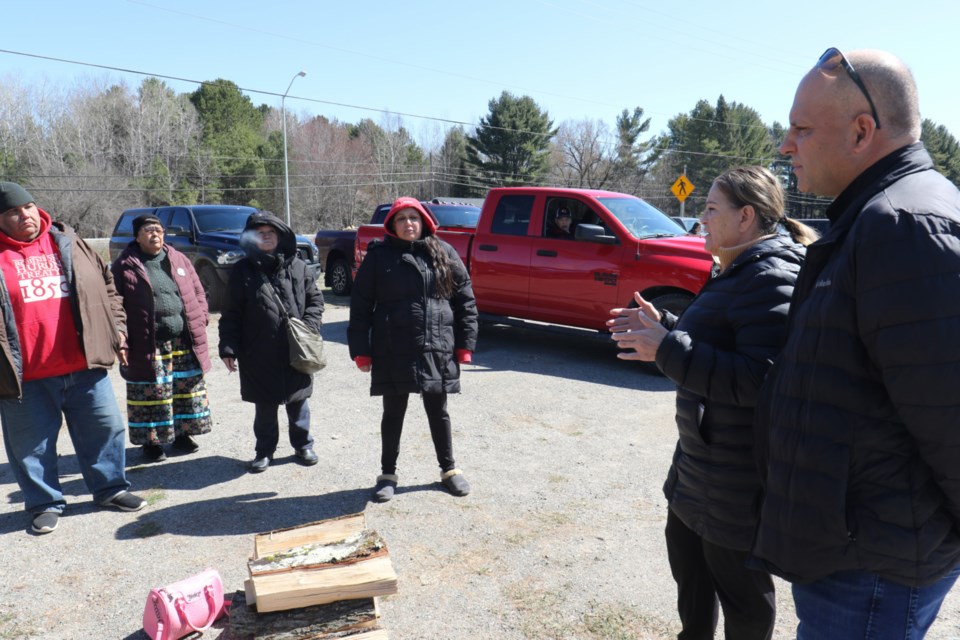A small yet vocal group of community members gathered outside the band office in Garden River First Nation Wednesday morning to demand answers from their chief and council.
They say a lack of information on the First Nation’s share of the historic $10-billion settlement for past compensation — over minuscule treaty annuities that followed the signing of the 1850 Robinson Huron Treaty as wealth generated in the territory from the fishing, mining and forestry sectors continued to grow — is continuing to cause rampant rumours, speculation and misinformation around the disbursement of millions of settlement dollars that will eventually flow into 21 First Nations across northeastern Ontario.
But for some community members, there are just two things they really want to know.
“All I want to know is how much, and when — and these people want to know the same thing,” said former Garden River First Nation band councillor Cindy Belleau-Jones. “Just answer two questions, that’s all.”
The utter confusion around the disbursement of the settlement — which is being held by the Robinson Huron Litigation Fund as it collects $1.3 million in daily interest, as first reported by SooToday — drew the ire of some band members camped outside the community’s administration building.
“We’re trying to get answers, and that’s what disturbs me. We’re not getting answers,” said community member William Lothrop.
Wednesday’s demonstration comes after Garden River First Nation issued a vaguely worded public statement confirming that band members will not receive a 100 per cent per capita distribution of the annuities settlement. According to the release, the “decision follows a careful review of the treaty's implications and a recent judicial clarification regarding annuity distributions.”
Band members who gathered Wednesday say that decision should’ve included input from membership.
“We’re getting pushed out. We don’t even know what’s going to go on next,” said community member Daniel Leblanc. “It’s peaceful — we’re not here to protest, we’re not here to riot. We’re not here to do anything like that.
“We’re here to find out. Come talk to us. Everything that’s made as a decision for the people, the people need to decide — not just chief and council. That’s a dictatorship, that’s not democracy at all.”
Garden River First Nation Chief Karen Bell, accompanied by council member Travis Jones, eventually came out of the band office to speak with the disgruntled group.
“You promised the people the money, and where’s our money?” asked community member Rene Belleau.
“I promised the people the money, yes — the money’s not here yet, how am I going to give you money?” replied Bell.
Jones stressed to band members the complexities of the Compensation Disbursement Agreement, which was formalized and voted on by all 21 First Nations more than a decade ago.
“This affected the individuals and the collective, so how do we do that? This is such a complex thing,” Jones said. “I love this, our council likes that our people are passionate about this, but there’s other people — a lot of people — that don’t want 100 per cent, because they want investments for their community, both on and off reserve.”
Bell stressed that “no First Nation is giving 100 per cent” per capita distribution of the funds to their members and that the Robinson Huron Litigation Fund informed chiefs and trustees that First Nations wouldn’t have enough money to “give out all at once,” due to the settlement being broken up into three "priority payments," which could expose First Nations to potential litigation.
“A lot of us aren’t on your level in terms of education, you know what I mean?” quipped Belleau at one point. “You need to teach us people on your level, too. The basics.”
Earlier this month, Garden River First Nation announced that it had appointed former Sault mayoral candidate Robert Peace, who is non-Indigenous, to facilitate a series of community engagement sessions to help inform chief and council on how the settlement dollars should be distributed throughout Garden River.
But for John Syrette, much like other community members gathered outside the band office, those engagement sessions haven’t been happening fast enough.
“Obviously it’s going to be difficult, but I think if we can get some dialogue going where people can actually be given the chance to talks about this with leadership, we can take the anxiety level down in this community — because right now, there’s been so many rumours, speculation and everything that goes along with that,” Syrette said.
Bell ultimately decided to schedule a community meeting for the evening of May 1.
“We’re not hearing enough, and that’s what I’m hearing — ‘you’re not listening to us, we want to have a say.’ I just committed to you, we’re going to have that day to have that say,” Bell said.
